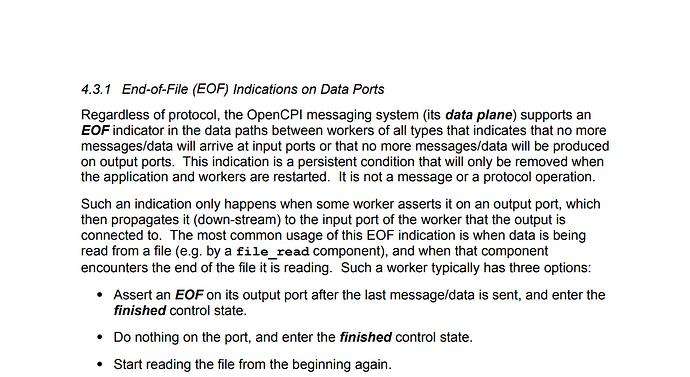I am trying to understand why when I run function in a RCC worker needs to return RCC_ADVANCE then has to run again to return RCC_ADVANCE_DONE otherwise I don’t get any output.
I have written a very basic first application in OpenCPI to understand the very basics. I have a simple RCC file, source.cc below, which simply takes some configured values and writes out ‘data’, 0 - 2000, to a binary file.
If I run the source.cc file below then I get as expected the short values 0 to 1999 written to the binary file output_file.bin
But if instead I remove the done processing and end after a single run like this:
out.setEOF();
return RCC_ADVANCE_DONE;
Then I don’t get any output to output_file.bin
Why do we need the 2 calls to the run function? Trying to understand how this works?
source.cc:
class SourceWorker : public SourceWorkerBase {
size_t samples;
bool done {false};
public:
SourceWorker() : samples(0) {}
RCCResult run(bool /*timedout*/) {
std::cout << "run called, samples=" << samples << std::endl;
std::cout << "out.data().real().capacity()=" << out.data().real().capacity() << std::endl;
std::cout << "properties().nsamples=" << properties().nsamples << std::endl;
std::cout << "samples=" << samples << std::endl;
std::cout << "properties().value=" << properties().value << std::endl;
if (!done) {
out.data().real().resize(properties().nsamples);
int16_t *p = out.data().real().data();
for (int16_t i = i; i < properties().nsamples; ++i)
{
// will appear little-endian in binary file, eg last byte
// will be cf07 - 1999 decimal
*p++ = i;
}
}
if(!done)
{
done = true;
std::cout << "returning RCC_ADVANCE\n";
return RCC_ADVANCE;
}
else
{
out.setEOF();
std::cout << "returning RCC_ADVANCE_DONE\n";
return RCC_ADVANCE_DONE;
}
}
};
application xml:
<Application package='local.file_replay' finished='file_write'>
<Instance Component="source" Connect='file_write'>
<property name="value" value="5"/>
<property name="nsamples" value="2000"/>
</Instance>
<Instance Component="ocpi.core.file_write">
<Property Name="fileName" Value="output_file.bin"/>
</Instance>
</Application>
source-comp.xml:
<ComponentSpec>
<Property name="value" initial="true" type="short"/>
<Property name="nsamples" initial="true"/>
<Port Name="out" Producer="true" Protocol="rstream_protocol"/>
</ComponentSpec>
output when run:
ocpidev run application replay_app.xml
======== Running local XML application(s): replay_app.xml
========= ocpirun replay_app
run called, samples=0
out.data().real().capacity()=4096
properties().nsamples=2000
samples=0
properties().value=5
returning RCC_ADVANCE
run called, samples=0
out.data().real().capacity()=4096
properties().nsamples=2000
samples=0
properties().value=5
returning RCC_ADVANCE_DONE
